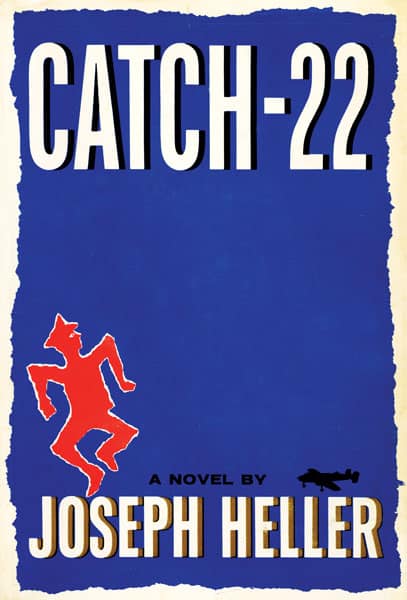ALEX MACPHERSON
Arts Writer
Notoriously Verbose: a weekly book review by the Sheaf’s long-time volunteer and friend Alex MacPherson.
Catch-22, Joseph Heller’s magnificently subversive rumination on the madness of war, the evils of bureaucracy and the ineluctable absurdity of the human condition, is my favourite novel.
I have read it a dozen times over, and it comes easily to hand whenever I find myself slouching about, opening books at random. No house can be my home unless adequately supplied: toilet paper, boxed wine and a copy of Catch-22.

 After deciding to write a series of articles on literature—a decision I interpreted as carte blanche to write about whatever I liked—I experienced a period of turbulent and disjointed thought. I was ecstatic at first; a voracious consumer of books, I revelled in the opportunity to share my first great love with others.
To my dismay, trepidation soon replaced enthusiasm. It occurred to me that reading books and writing about them are mutually exclusive: skills applying to one do not easily translate to the other. Reading has always come naturally, but the domain of literary criticism seemed turbid and impregnable.
Undaunted, I embarked on a campaign to familiarize myself with the discipline of “lit-crit.” This crusade did not amount to much. Preferring comatic idleness to frenetic activity, I perused the library’s robust collection for a suitably slim volume.
My pretence for such indolence was characteristically flimsy: having read one book of criticism, I thought, was vastly superior to not having read any books of criticism. I wish my high school math teacher, who so forcefully emphasized the relationship between zero and one, could see me now.
Paradoxically, the volume of criticism I read proved equivalent to zero, at least insofar as it prepared me for writing about literature. The collection I selected, The War Against Cliché by Martin Amis, is as funny as it is incisive.
“There was only one catch and that was Catch-22, which specified that a concern for one’s own safety in the face of dangers that were real and immediate was the process of a rational mind. Orr was crazy and could be grounded. All he had to do was ask; and as soon as he did, he would no longer be crazy and would have to fly more missions.”
Amis is perhaps the most blindingly incandescent literary talent to emerge from Britain in the late 20th century. His prose is impeccable, his insight profound. His writing is deeply, caustically funny. Although I had resolved to learn much, the time I scheduled for absorbing details of style and technique was largely consumed by laughing uproariously.
My predisposition to languid torpor compelled me to give up attempting to read about literature prior to writing about it. I elected to abandon established forms — despite knowing that they are venerable for good reason— and simply write essays about books I happen to like. To hell with tradition and respectability, I thought. This rather bold statement was followed by the most inauspicious attempts at writing I have ever experienced.
 Given my predilection for the book, it seemed natural to begin with Catch-22. After all, some wag once opined “write what you know.” Although largely nonsensical — try explaining Frankenstein in those terms — I thought it seemed appropriate for the occasion. Writing about Catch-22 seemed more prudent than writing about, say, Finnegan’s Wake. (No one understands Finnegan’s Wake. If you encounter someone claiming otherwise, be very suspicious.)
It became apparent almost immediately that writing what I knew was preposterously difficult. My admittedly lame attempt at reading legitimate criticism was demonstrably ineffective; I remained a rank beginner.
My written experimentations produced weak and impotent results. Every sentence I committed to paper was futile: ideas that rang true in my mind appeared prolix and flaccid on the page. I created pathetically hollow simulacrums of meaningful prose. My efforts did not — could not — succeed in conveying the revelatory brilliance and towering genius of Heller’s masterpiece.
Desperation grew into despair. Until, that is, I recalled the fundamental premise of the novel. Heller’s twisted logic is best instantiated by a description of the many difficulties facing a pilot named Orr:
“There was only one catch and that was Catch-22, which specified that a concern for one’s own safety in the face of dangers that were real and immediate was the process of a rational mind. Orr was crazy and could be grounded. All he had to do was ask; and as soon as he did, he would no longer be crazy and would have to fly more missions. Orr would be crazy to fly more missions and sane if he didn’t, but if he was sane, he had to fly them. If he flew them, he was crazy and didn’t have to; but if he didn’t want to, he was sane and had to.”
Joseph Heller, it seems, created something transcendental, for Catch-22 applies everywhere. Its brilliantly absurd logic permeates the very fabric of life. It walks among us, cloaked in the veils of respectability and regulation, waiting to madden and infuriate. Anyone who has ever had dealings with the innermost bowels of government bureaucracy will know exactly what I mean.
The perverse catch applies with equal dynamism to the realm of literary writing. I didn’t write anything meaningful about Catch-22 because Catch-22 prohibited it. I would be sane if I attempted to elucidate reasons why Catch-22 is worth reading and crazy if I didn’t. But the galactic scope and unimpeachable quality of Heller’s novel implies that only a crazy man would think its manifold virtues could be covered in a 1,000-word article; sane men would knowingly skirt the trap and avoid mentioning anything at all.
 So please, buy a copy of Catch-22 and see for yourself how dangerous sanity and logical insanity vie for your allegiance, pulling at the core of your mind with unrelenting pressure. It will change your life, but you’ll never be the same again.
Leave a Reply